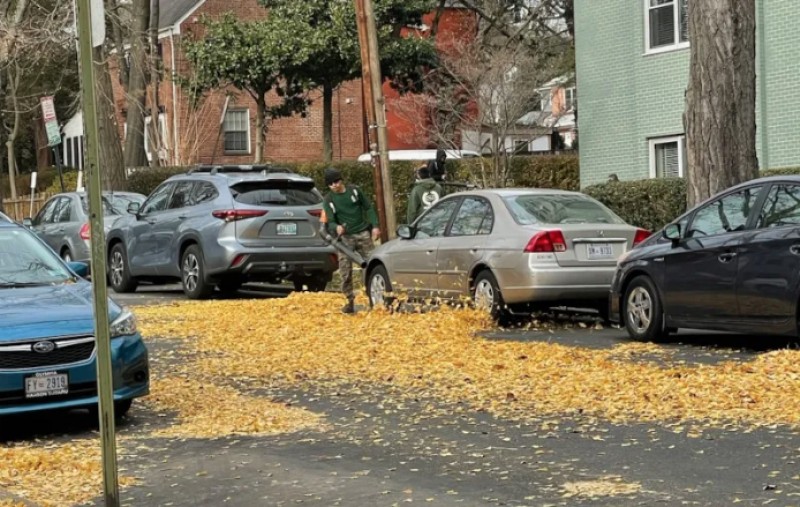by Kathy Sykes
Some good news – the DC ban on gas-powered leaf blowers goes into effect on January 1st, 2022. Until September 30th, 2022, DC is offering rebates for electric leaf blowers purchased: $75 for commercial-sized blowers and $50 for residential ones. However, my hope is that after reading this article you will choose instead to use rakes on lawns and gardens and brooms on sidewalks. We need a Hippocratic Oath for lawns and gardens: Do no harm!
Leaf blowers and ecological health
Leaf blowers of all kinds damage the soil and harm the ecosystem. Their power blows away topsoil and can also damage plants. When used too frequently, leaf blowers can compact the soil and make it more difficult for water and air to penetrate.
There is a tremendous benefit to letting leaves stay where they fall in gardens and on our lawns, and sweeping them from the sidewalks into those areas. The leaves will slowly break down and naturally improve the soil’s water retention and its fertility. Leaves are nature’s free gift to us; no chemicals or fertilizers needed.
Plus, many types of wildlife, including earthworms and thousands of insect species, depend upon the layer of leaves in your garden or on your lawn. Ninety-four percent of moth species spend the winter embedded in leaves during their egg or pupae stages, as does the freeze-tolerant woolly bear caterpillar. In spring, if it survives the leaf blowers and rakes, the woolly bear will emerge as a tiger moth.
Furthermore, some 96 percent of bird species rely upon moth and butterfly caterpillars to feed their young. Many species of birds, such as wood thrushes, robins, and sparrows, forage in the leaf layer looking for tiny bites of invertebrates and insects. By removing fallen leaves, you will have fewer insects, birds and bird songs in your garden come spring.
The reasons for the gas-powered ban include human health impacts
The organizers of the effort to ban gas-powered leaf blowers in the District listed several human health harms, which include respiratory disease, risk of heart attack, and hearing loss.
Gas-powered leaf blowers operate by mixing oil with gasoline. A third of the mixture is not burned. It ends up as an aerosol combustion product containing harmful toxins including carbon monoxide and carbon dioxide. These pollutants have also been linked to cancer, heart disease and asthma. A 2011 study found that using a two-stroke gas-powered leaf blower for 30 minutes generates more pollutants than the emissions from driving a Ford F-150 truck 3,900 miles, or the distance from Texas to Alaska.
Other air pollutants come from the dust leaf blowers generate. It contains potentially dangerous substances including pesticides, mildew, animal fecal matter that can cause irritation, allergies and disease.
Noise is another oft-cited issue causing harms to both the lawn care workers using this equipment and people living and working nearby.
The CDC identifies leaf blowers as a common noise that can lead to hearing damage and contribute to permanent hearing loss. Leaf blowers average between 89 decibels and 106 decibels. According to the CDC, the sound intensity at which a gas-powered leaf blower causes hearing damage after two hours of exposure is 80 to 85 decibels.
Distance lessens the risk of hearing loss, but does not eliminate other human health risks from prolonged exposure to excessive noise. Studies have demonstrated that noise exposure disturbs sleep and causes daytime sleepiness, increases hypertension and cardiovascular disease, and “impairs cognitive performance in schoolchildren.”
A 2017 study examined the noise impact from a single typical landscape maintenance operation, but noted that within a given community, more than one leaf blowing operation may be occurring simultaneously and for extended periods of time. The cumulative noise would therefore “intensifying the harmful effects of these sound sources.” On my block I can attest to the continuous drone of leaf blowers that seems to occur almost daily.
So please, support our ecology and health. Use a rake and broom.
https://www.foresthillsconnection.com/news/opinion-take-the-lawn-and-garden-hippocratic-oath-and-give-leaf-blowers-the-boot/




